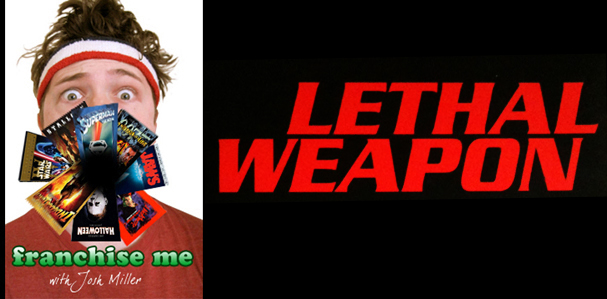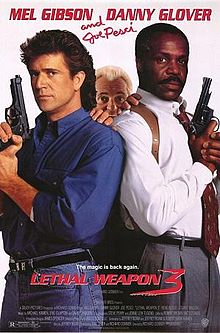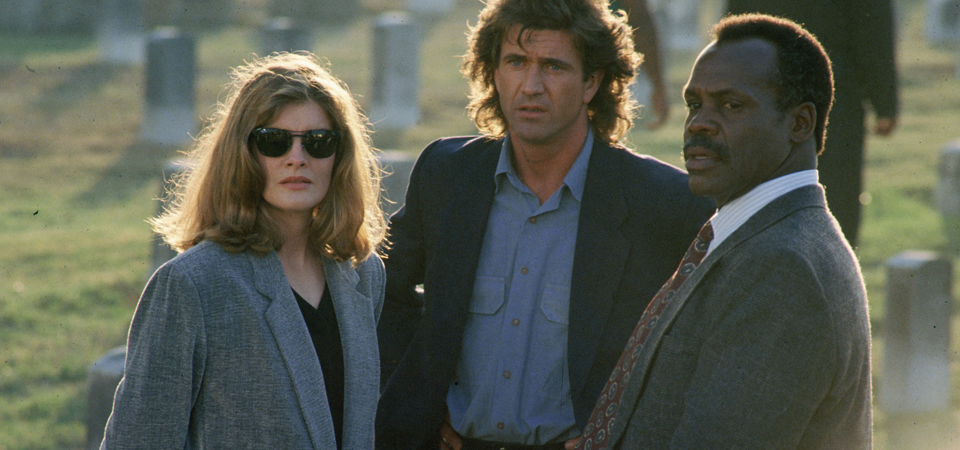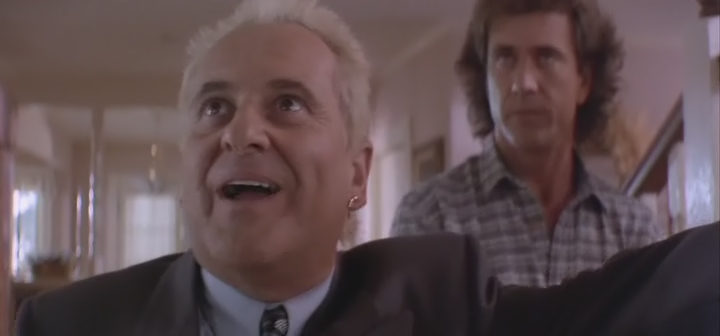
Hollywood loves a good franchise. The movie-going public does too. Horror, action, comedy, sci-fi, western, no genre is safe. And any film, no matter how seemingly stand-alone, conclusive, or inappropriate to sequel, could generate an expansive franchise. They are legion. We are surrounded. But a champion has risen from the rabble to defend us. Me. I have donned my sweats and taken up cinema’s gauntlet. Don’t try this at home. I am a professional.
Let’s be buddies on the Facebookz!
The Franchise: Lethal Weapon — following the personal and professional lives of aging and put-upon Los Angeles homicide detective Roger Murtaugh and his loose-cannon partner Martin Riggs. The franchise comprises four feature films, from 1987-1998.
previous installments
Lethal Weapon
Lethal Weapon 2
The Installment: Lethal Weapon 3 (1992)

The Story:
Riggs and Murtaugh are still at it, bickering, playing by Riggs’ rules, destroying public property. When Riggs’ sociopathy and Murtaugh’s pathological submissiveness destroy an entire building, the two get busted back down to street cops. While walkin’ their beat, they foil the attempted hijacking of an armored car, capturing one of the hijackers. The hijacker’s gun is loaded with special armor-piercing bullets. Complicating matters worse, former LAPD Lieutenant and current arms dealer, Jack Travis (Stuart Wilson), wanders into the precinct and murder the hijacker. Now shit has gotten real. Internal affairs Sergeant Lorna Cole (Rene Russo) joins the situation, and immediately gets all sexual tension-y with Riggs. Leo is still around for some reason, now as a real estate agent trying to sell Murtaugh’s house so Murtaugh can retire. Murtaugh kills a teenager. He gets all bummed out, even though he’s killed quite a few people already. Needless to say, our boys want revenge on the guy who I guess is responsible for Murtaugh shooting a kid — Jack Travis. So they kill him. Hurray!

What Works:
Lethal Weapon 3 is something of a reflexively constructed companion piece to Lethal Weapon 2, as it seems to directly address almost all the flaws LW2 had. Almost. It has its own problems, to be sure, but pragmatically speaking a franchise should be learning from the mistakes of previous installments (though few actually do). And it almost seems as if returning screenwriter Jeffrey Boam and newly added Karate Kid scribe Robert Mark Kamen broke down LW2‘s script failures, reflected on them, and then constructed LW3 as a reaction piece. The two biggest improvements are:
1) Murtaugh had nothing to do and was conspicuously disconnected from the Apartheid storyline.
Lethal Weapon made Danny Glover famous. But it made Mel Gibson a movie star. LW2 reacted to this predictably and foolishly, effectively demoting Murtaugh to Riggs’ shit-on sidekick and giving Riggs every single good line, bit of action, subplot, and both of the film’s two villains as adversaries. Most ridiculously, of course, Riggs was the one for whom South African racism really chapped his ass. LW3 re-balances things. Each character should get half of the film. Riggs is younger, handsomer, and single, so it makes sense to give him the romantic subplot. That means Murtaugh should have the thematic subplot. Here that subplot begins when Murtaugh is “forced” to kill a teenaged gangbanger, whom he recognizes afterwards as one of his son’s friends. This sends Murtaugh into an emotional tailspin. He’s killed plenty of people, generally giving it absolutely no thought whatsoever, but this is a teen and someone Murtaugh knows. And black youth getting sucked into the allure of crime is something already on his mind, as we see earlier in the film when Murtaugh spots his son Nick (Damon Hines) hanging with some local thugs. So in a sense Murtaugh feels he could have easily shot his own son. The fallout of this event is dark — some is heavy-handed, like the cliche funeral scene in which the dead boy’s mother slaps Murtaugh and the boy’s father demands that Murtaugh catch the man “who put the gun” in the boy’s hands. But this isn’t a franchise known for its subtly, so I’m not about to start chastising it for being obvious now. The franchise needed something to reground it, and it is nice to get some sense of consequences in this world.
LW3 also reaches back to Lethal Weapon for Murtaugh inspiration. The first film’s driving character force was Murtaugh concerned about his age, turning 50 in his opening scene. LW3‘s driving character force is Murtaugh’s impending retirement. The man is after all getting far too old for this shit, as he keeps reminding us. Adding little elements, like Riggs discovering that Murtaugh now wears a girdle to hold in his gut (funny), or Murtaugh accidentally shooting his gun in the locker room (depressing), keeps this important part of the character going. The impending retirement also benefits Riggs, as – though LW2 forgot this – we’re supposed to be dealing with a yin and yang character duo. Murtaugh needs Riggs to feel alive, and Riggs needs Murtaugh to stay alive, for stability. Riggs begins acting out, with an increasing insecurity of what will happen to him without Murtaugh in his life every day. This comes to a head in the film’s best Riggs/Murtaugh moment — when Riggs confronts a depressed and drunkenly downward-spiralling Murtaugh on Murtaugh’s boat, and the two men get into a fist fight that ends with them floating in the water as the Coast Guard comes to investigate their ruckus — and sharing their bro-mance feelings. The scene reminds us of what’s supposed to be happening with these characters beneath the increasingly wacky antics the franchise invents for them. They need each other.
2) Rika Van Den Haas had nothing to do with the story. And neither did Leo Getz.
The way LW2 dealt with the dead former Mrs. Riggs was outright embarrassing — using her memory to try and provoke emotions from us, when Riggs himself barely seems to care unless he’s angry. But we want Riggs to move on, find someone new, stop being lonely Uncle Riggs to the Murtaugh children. Rika was the first girl we had seen him interested in, and the movie miserably blew it by treating her like a Bond girl, there to be hot and for Riggs to plow briefly. The fact that the movie killed her just made the subplot even more immaterial. And don’t even get me started on the whole Vorstedt killed Mrs. Riggs thing again.
Lorna Cole shows us how things should be done, as far as a romantic interest for Riggs is concerned. She also shows us how it is done as far as adding a new main character to the franchise. Both Rika and Leo were involved with the South Africans, but only as character background (Leo we can presume handled their money laundering). Riggs doesn’t use Rika to get to Arjen Rudd, and Riggs and Murtaugh don’t use Leo to get to him either. The two characters are just kind of there, fulfilling a basic function. Rika was eye-candy and Leo was comic relief. Cole is a very well constructed character to bring in. On just a story exposition level, she is the one with the knowledge about our villain Jack Travis. On a story friction level, as an internal affairs officer, she initially serves as a mild antagonist for Riggs and Murtaugh. And on a character level, whereas Rika was merely visually appealing to Riggs, Cole appeals to him with substance too. She is a fun character. Riggs didn’t banter with Rika. But this is a franchise built on banter. At this point, that’s really all we have! (That and explosions and car chases.) Riggs banters with Murtaugh. He banters with Captain Murphy. He banters with Leo. He banters with everyone. He should, logically, also banter with his romantic interest. So Cole enters feeling like she is part of the game. And the fact that she and Riggs fall in love by the end of the film makes her relevant. I want to see her in the next film; unlike Leo, who I shall bitch about in the next section.
Cole and Riggs have a fun His Girl Friday vibe, Cole constantly attempting to emasculate Riggs with moments like seeing Riggs’ nasty wound and responding, “That scratch?” She adds new wrinkles to a franchise that was becoming dangerously stale after only two installments. The Jaws-esque scene in which Riggs and Cole attempt to one-up each other with their in-the-line-of-duty body scars is like a classic comedy routine, made all the more entertaining because it is also sexual foreplay. The Riggs we saw with Rika was smooth. I like this Riggs better. He needs to wade through a hill of distraction before making his move. Which makes Cole and Riggs’ sex scene play interestingly when compared with the aforementioned Riggs/Murtaugh’s boat fight — the fight follows the exact same structure; Riggs needs to show up and yell and scream and trade punches with Murtaugh before he can actually open up about his fears of abandonment. Cole also adds something to Murtaugh too, as her all-business bravado makes her yet another loose-cannon in Murtaugh’s life that he must bitch about, like after Cole tells Murtaugh to cover her: “Cover you? Who’s going to cover me? Cover me! Cover him! Cover everybody! When is someone gonna cover me for a change?” Or the way Cole fucks up Riggs and Murtaugh’s preferred “on the count of three” schtick.
The film has several good action set pieces. Seeing an entire building destroyed is always fun. And I’m a sucker for action movies in which our heroes interrupt a sporting event (here Riggs, Murtaugh and Leo chase Jack Travis to a hockey game). But LW3‘s best set piece is an epic chase that begins with Riggs hanging from the front of a subway car and leads to a long freeway chase, complete with the great bit in which Riggs, riding a motorcycle, just barely safely ducks while driving under the trailer of a semi-truck, smashing off the bike’s windshield. And climaxing with a great stunt shot of Riggs falling off a tall construction site, away from the camera and in slow motion, screaming “Shiiiiiiiit!”
It is also fun to see that great case of nepotism, Steve Kahan (Richard Donner’s cousin), get something more to do as Captain Murphy than simply yell at Riggs and Murtaugh in his office. Though Travis kidnapping Murphy never really goes anywhere, it is fun all the same for fans. He even gets to kill a guy. People resent nepotism, but Kahan always suited and played Murphy well. So good for him.
The film’s ending is interesting. Replaying Murtaugh’s first scene in Lethal Weapon, when his family surprised him in the bathtub with a birthday cake, LW3‘s epilogue features an homage scene where the Murtaugh clan surprises Roger in the tub with a retirement cake. And Riggs now happily has Cole, he’s turned a corner. He won’t be alone when Murtaugh retires. The franchise could end here as a triology. But that ain’t the tone of this franchise. So Murtaugh tells his family that – despite being 56 – he isn’t going to retire. The shenanigans will continue!

What Doesn’t Work:
Lethal Weapon was about two cops stepping outside the law to fight an international paramilitary group no one else could get to. LW2 was about two cops stepping outside the law to fight an international political group no one else could touch. LW3 is about two cops fighting a Los Angeles-based mobster that is completely within their jurisdiction. The movie invents a reason why Jack Travis isn’t really in their jurisdiction, but it doesn’t feel like he isn’t. Inter-department politics feels incredibly blah in comparison to diplomatic immunity. “Know your role,” should be the mantra of any franchise sequel. One might say, “It think it is good that the franchise finally rooted itself in some semblance of plausibility.” But that isn’t what this franchise is. These movies have preposterous storylines. I mean, super villain South Africans? That is so absurd it is kind of amazing. Jack Travis is just a corrupt ex-cop who sells guns and ammo now. That feels like a major step down. Another major step down is the casting. It is interesting that the LW franchise never casts a star, or even a well-known character actor, as its villain. Stuart Wilson is a decent actor, but lacks the presence that is required to prevent his character from getting lost in the mix. Joss Acklund is what saved LW2, because he stuck in your mind, which allowed the film to ignore him, yet he nonetheless remained a mountain fixed on the horizon for our heroes to be striving towards. Jack Travis is a boring villain, with boring, ambiguous plans. LW3 lacked the bombast of the first two films, which is a sorry shame, because in almost every way it is a better film than LW2. But it feels decidedly smaller and inconsequential.
Which isn’t to say that Jack Travis isn’t preposterous in his own ways — just not the right ones. I get the impression the LW team doesn’t know how to handle a small-scale villain. Travis walks right into the police station, flashing his old badge, and kills a witness who is sitting in a questioning room. That’s the sort of absurdity we should expect/want. But without diplomatic immunity or whathaveyou protecting Travis, the aftermath becomes eye-rolling. Jack Travis peddles bullets called “cop killers” and he murdered someone in a police station, on camera. In what sort of upsidedown world is catching this guy not the LAPD’s top all-in priority? Every time we see him he’s farting around a construction site. The guy isn’t hiding in a cave in Afghanistan. How is it no one can find him? But, okay, whatever, this is a movie, I’ll accept that one. LA is a big place. Can’t be everywhere at once, right? Where is the one place you might assume that the cops could be? If you said at the police station, we’re on the same page. So, where is it that Jack Travis kidnaps Captain Murphy? If you guessed the exact same fucking police station, you would sadly be correct. That’s right, Jack Travis – the ex-cop who shamed this LA precinct by exposing their shit security and murdering a witness in their own home – manages to stroll back onto the police parking lot, in broad daylight, and single-highhandedly abduct a police Captain while tons of other cops are around, and no one notices. Now that’s what I call writing!
But moving on to our heroes…
Riggs is the worst cop ever. And Murtaugh’s gullibility and subservience to Riggs make him just as bad. This is an area that I wish LW3 had also reflected on when correcting the mistakes of LW2, because certain aspects of these characters are just getting worse. The whole opening of the film, if viewed as a stand-alone adventure, is fun — Riggs trying to defuse a car bomb, even though he doesn’t know how. It is like a vaudeville routine, with Riggs constantly changing which color wire he says he’ll cut, and then climaxing with the great “Grab the cat” reveal that Riggs fucked it all up. But what the fuck is happening here? Why does Riggs even want to try and defuse the bomb? Why does Murtaugh let him? Why does anyone on the scene not try and stop them? What is most frustrating is that this scene easily could have worked if the filmmakers had given any excuse or context for Riggs and Murtaugh needing to defuse the bomb. How hard would that have been? The filmmakers seem to no longer get what his original death wish was all about. For one thing, his former death wish tendencies worked better when he was only putting his own life in danger. Now he’s constantly putting Murtaugh and others in danger too. This makes it perplexing when Mrs. Murtaugh tells Riggs to watch after Murtaugh after giving him a bullet proof vest. Uh, is she somehow completely unaware that it is Riggs who is constantly getting her husband nearly killed?
This franchise is increasingly becoming fascinated with our heroes being “charming” sociopaths, which is bad enough when regular heroes behave this way — but cops? Riggs and Murtaugh’s punishment for destroying an entire building is getting busted down to beat cops. The first thing they do once they’re back in uniforms and patrolling the street is bust a guy for jaywalking. While the man stands there, rightfully upset to be getting a ticket for such an asinine crime, Riggs and Murtaugh can’t even figure out how to fill in the ticket itself. Okay, that’s funny. But then, when this man again gets rightfully annoyed, Riggs pulls his gun on the guy and pretends to want to kill him. Pretends. He. Is. Going. To. Kill. Him. “Let’s just shoot him. We can make it look like suicide.” Ha ha ha ha ha! Oh, our boys are so silly. Once again, the “jokes” in this scene could easily have worked, but Donner apparently wants us to like the reckless and frivolous way that Riggs and Murtaugh treat their powerful and important positions in society, as though we’re laughing at underdog frat boys being subversive in Animal House or something — doing the things we wish we had the nuts to do.
And that’s where these characters are starting to fail, undermining Gibson and Glover’s still flawless chemistry. We like watching heroes be pricks to the kinds of people who drive us crazy in real life — bosses, neighbors, clerks, and, well, cops. It is fun to watch Fletch fuck with people in Fletch because he’s just a reporter. He has no power. Or even Axel fuck with other cops in Beverly Hills Cop. But for anyone who has had a negative run-in on any level with a cop, there is nothing charming or fun about cops abusing regular citizens to amuse themselves (unless it is something intentionally out-there like Super Troopers). Cops are alphas. They can’t be subversive in this fashion. Riggs is a bully. He just goes around fucking shit up and then punishing those who attempt to call him on his bullshit. We mostly ignore this because Mel Gibson is charming and fun (though not as much these days), but I don’t like that this element is getting worse with each installment. And even though Murtaugh was given a much fairer shake in this film, it bothers me that the filmmakers seem to enjoy portraying him as less than Riggs. Hell, the film ends with an exchange where Murtaugh tells Riggs that he hopes Riggs’ next partner gives Riggs just as much shit as Murtaugh has had to endure, to which Riggs smugly replies: “That’s not gonna happen, Rog. Because there’s winners and there’s losers and God wouldn’t do that to me.” On the money, man — if by “God” Riggs is referring to his creators, the filmmakers.
Leo. Leo Getz represents a franchise trap, a trap that I actually pity filmmakers for having to deal with. Leo and his “they fuck you at the drive-thru” rant were the break-out hit from LW2. If Lethal Weapon were a TV show, Leo would have become a recurring character. Movies, sadly, can’t work the same way. A character is either in a sequel, or it isn’t. From a fan perspective, Leo absolutely should be in LW3. But watching the finished product you realize you have to be careful what you wish for. Sometimes as a filmmaker you need to be a parent. We’re like kids. We don’t always know what is best for us. And Leo is the sugar that gives us a stomach ache and ruins our dinner. He was an assignment for Riggs and Murtaugh, and one they seemed to largely hate. I just don’t believe either man would want Leo in their lives, and having him go with them on their investigations just feels idiotic. Leo was a funny character that Pesci knocked out of the park, but his one glaring flaw was how pointless he was. Bringing him back only compounds that problem. He serves more of a purpose to the plot in LW3, but he is ugly fan-pandering — the fact that he has yet another “they fuck you at ____” rant almost ruined the entire film for me. The movie itself even seems to hate him! In one scene, when Leo enters, the score hits a waah waaah waaaaah cartoon cue, echoing my own feelings seeing him appear.
Part of me wants to complain about the fat, sassy black female cop who white-people-wrote-this jive talks her way through an action sequence and then develops a crush on Murtaugh, but above all else this franchise (despite its R-rating) really appeals to boys. And when I saw this film as a kid I thought she was hilarious. So, I’ll give it a slight pass. But I do need to complain about Red Shirt, as I’ll call him, since I can’t remember the character’s name. Red Shirt is a rookie cop, who we meet basically one scene before he talks Riggs into letting him come on a mission, because, wait for it, it is his birthday. Then Travis kills him. Then Riggs tells his corpse, “Happy birthday, kid.” I can’t think of a cheaper attempt to toss drama into a story than the classic ‘red shirt’ death (this is a Star Trek reference, if you’re not familiar; Google dat shit). As dumb as this franchise can be, I honestly expect more from it than lazy crap like this.
This is minor, but there is something a bit disingenuous about a franchise that has so gleefully showcased our heroes gunning down criminals – with no attempt to simply wound them – getting all uppity about ‘cop killer’ bullets and teens getting guns. And clearly Richard Donner was well aware of this, as LW3 has the franchise’s lowest body count; a rare installment in which the villains wrack up a nearly equal body count as our heroes.

Body Count: 15
Best Kill: The random bearded goon that Murtaugh kills by tossing a construction hatchet tomahawk-style into his chest.
Best Line:
Riggs: Where’d you learn to fight like that?
Cole: Catholic school.
Corniest Line: After burying one of his goons in wet cement.
Jack Travis: Now we’ve got a relationship we can build on.
Worst Line:
Cole: This PMS. It’s murder.
Murtaugh: Yeah, I know what you mean. I’ve been married 25 years.
Riggs Worst Cop Moment: Putting a sack over a parking meter so he doesn’t have to pay.
How Often Murtaugh Is Too Old For This Shit: 1
Richard Donner’s Political Propaganda: 1) The indoctrination of inner-city kids into violent crime. 2) The Exxon Valdez oil spill. When Riggs is siphoning gas, he spits it from his mouth, then cracks, “Yuck, Exxon.”
Should There Be a Sequel: Uh, I guess. Sure. For those who enjoy it, the formula is still sound. But we really need to get rid of Leo.

Up Next: Lethal Weapon 4
DISCUSS THE FRANCHISE ON THE BOARDS
previous franchises battled
Critters
Death Wish
Hellraiser
Home Alone
Jurassic Park
Leprechaun
The Muppets
Phantasm
Planet of the Apes
Police Academy
Psycho
Rambo
Tremors